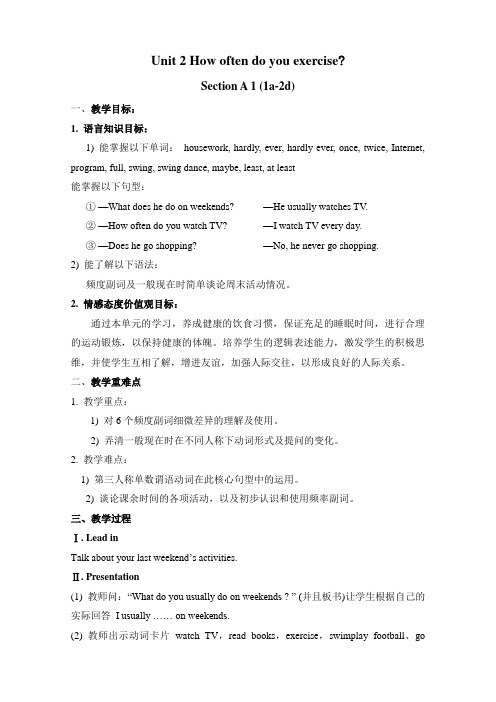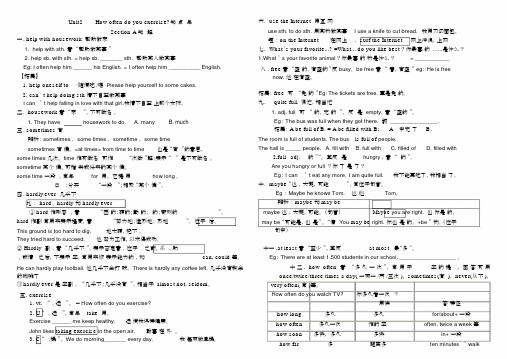unit2 how often doyou exercise Section B 1
- 格式:ppt
- 大小:6.48 MB
- 文档页数:47




Unit 2 How often do you exercise?Section A 1 (1a-2d)一、教学目标:1. 语言知识目标:1) 能掌握以下单词:housework, hardly, ever, hardly ever, once, twice, Internet, program, full, swing, swing dance, maybe, least, at least能掌握以下句型:①—What does he do on weekends? —He usually watches TV.②—How often do you watch TV? —I watch TV every day.③—Does he go shopping? —No, he never go shopping.2) 能了解以下语法:频度副词及一般现在时简单谈论周末活动情况。
2. 情感态度价值观目标:通过本单元的学习,养成健康的饮食习惯,保证充足的睡眠时间,进行合理的运动锻炼,以保持健康的体魄。
培养学生的逻辑表述能力,激发学生的积极思维,并使学生互相了解,增进友谊,加强人际交往,以形成良好的人际关系。
二、教学重难点1. 教学重点:1) 对6个频度副词细微差异的理解及使用。
2) 弄清一般现在时在不同人称下动词形式及提问的变化。
2. 教学难点:1) 第三人称单数谓语动词在此核心句型中的运用。
2) 谈论课余时间的各项活动,以及初步认识和使用频率副词。
三、教学过程Ⅰ. Lead inTalk about your last weekend’s activities.Ⅱ. Presentation(1) 教师问:“What do you usually do on weekends ? ” (并且板书)让学生根据自己的实际回答I usually …… on weekends.(2) 教师出示动词卡片watch TV,read books,exercise,swimplay football、goshopping、go to movies让学生回答。

Unit2 How often do you exercise?知点与Section A 知解一. help with housework 帮助做家1.help with sth. 意“帮助做某事”2.help sb. with sth. = help sb. _______ sth. 帮助某人做某事Eg: I often help him ______ his English. = I often help him __________ English.【拓展】1.help oneself to ⋯随便吃 /喝·Please help yourself to some cakes.2.can’ t help doing sth情不自禁做某事I can’ t help falling in love with that girl.我情不自禁上那个女孩。
二. housework 意“家”。
不可数名。
1. They have housework to do. A. many B. much三. sometimes 有辨析: sometimes , some times , sometime , some timesometimes 有候。
=at times= from time to time也是“有”的意思。
some times 几次。
time 作可数名可作“次数”解;表示“ ” 是不可数名。
sometime 某个候。
可指去或将来的某个候。
some time 一段。
常与for 用。
它提用how long 。
口:分开“一段”;相聚“某个候”。
四. hardly ever 几乎不比: hard、 hardly 和 hardly ever① hard 作形容,意“困的;硬的;勤的;的;苛刻的”。
hard 作副常用来表示程度,意“努力地;猛烈地;烈地”,位于后。
This ground is too hard to dig.地太硬,挖不。

Unit 2 How often do you exercise? 单元知识点讲解课件(共27张PPT)Unit 2How often do you exercise?八年级上册第二单元Section A The First Period1a-2d☆教材解读☆1.hardly(1)hardly是个副词,含否定意义,它的位置常在be动词、情态动词和助动词之后,行为动词之前。
与ever连用,意为“几乎从来不,很少”,意义上接近于almost never。
He could hardly see anything.他几乎什么也看不到。
It hardly ever rains here.这儿很少下雨。
(2)hardly用于反意疑问句时,后半句用肯定提问。
She hardly eats anything,does she 她几乎什么都不吃,是吗Section A The First Period1a-2d2.once,twiceonce表示“一次”,通常不写作one time,twice两次,通常不写作twotimes,三次或三次以上可以用times,如:three times三次。
3.fullfull adj.忙的;满的;充满的,作“忙的”相当于busy。
作“满的”讲常构成词组be full of“充满……的”,相当于be filled with。
This week is quite full for her.Don’t trouble her.这周她很忙。
不要打扰她。
The bus is full of students.=The bus is filled with students.公共汽车载满了学生。
Section A The First Period1a-2dalwaysusuallyoftensometimeshardly evernever从不, 从未很少, 几乎不有时经常, 常常通常, 一般总是100%0%Section A The First Period1a-2d频率副词always意为“总是”, 表示动作的重复或状态的延续。
Unit 2 How often do you exercise?SectionA1a—2c 导学案【课前预习】一、预习检测-----还记得他们吗?I. 将下列单词根据词义按照频率由高到低排列出来, 并且译为中文。
hardly ever, sometimes , always , often, usually, never100%, _______( ),_________( ),_______ ( ), _______( ),_________( ),_______ ( ),0% II. 英汉互译。
1. watch TV_________________2. go shopping ________________3. read a book4. exercise __________________5. 在周末6. 去看电影_________________7. 每天_________________8. 帮忙做家务_________________9.每周一次_________________ 10. 使用网络_________________ 11. 多久一次;多常12. 几乎不_ 【合作探究】Ⅰ. Warm up--What do you usually do on weekends? --Do you …on weekends?Ⅱ. Speaking practice: According to the picture finish 1a and add more weekend activities.a go shoppingb ____________ c_____________d ___________e ____________列举你在周末通常做的活动:___探究1 谈论周末经常从事的活动用一般现在时态,如果主语为第三人称单数,谓语动词要用第三人称单数形式。
A: What does he usually do on weekends?B: He usually watches TV.A: Does he go shopping?B: No, he never goes shopping.Ⅲ. Listening practice1. Listen to the tape about 1b and write the activities next to the correct frequency words.探究2 the usages of the frequency wordsI know —always(100%) ﹥almost always(90%)﹥usually(80%)﹥often (30%-50%)﹥sometimes(20%)﹥hardly ever( seldom )(5%)﹥never(0%) 观察与思考:通过听力,你能试着总结一下频度副词的含义及它们的区别吗?2. Listen to the tape about 2a, 2b and then choose the right answers.探究3 你能体会出“how often”的含义吗?____________。
Unit2 How often do you exercise?Section B 3a--self check一.根据句意以及汉语提示完成单词。
1.Anna's father is a (牙医).If there's something wrong with your teeth, you can ask him for help.2.More (比)twenty students in our class went to the park yesterday。
3.The library has all kinds of books,(期刊,杂志)and newspapers and you can choose(选择)any of them to read.4.They old man has three sons, but (没有一个)of them wants to live with him.5.Susan often stays up late and sleeps (较少)than six hours every night.二.用括号内所给的单词的适当形式填空。
1.Doing sports is good for our minds and (body).2.I read much (little) now than I did at school.3.Tom got ninety-seven (point) in the math test.4.Do you like the (writer) new book?5.Look! The flowers are (die). Can you get some water?三.单项选择。
()1.--My two teeth are bad. What should I do?-- You should .A.see a doctorB.go to the dentistC.have a good restD.eat nothing()2.Taking exercise a good way our bodies.A.Are, to keepB.are, keepingC. is,keepingD. is, to keep()3.Don't to late tonight, or you will feel sleepy in class tomorrow.A.get upB.put upC.stay upD.wake up()4.There are 50 students in our class. 75% students like going hiking.what does twenty five percent students mean?A.None of the students.B.All the students.C.Most of the students.D.Some of the students.()5.The birds singing came into our room the window and woke me up in the early morning.A.downB.fromC.throughD.across四.根据汉语意思完成句子。
Unit 2 How often do you exercise?Section 2a-2e一、单词拼写1.Can you tell me the r________ of the stampede (踩踏事件) in your school? 2.It’s good for my m________ to do more reading.3.Our success lies in working t________ as a team.4.Many hands make light work. We’d better work t________ to finish the task on time.5.Twenty p________ of the students in my class walk to school every day.二、适当形式填空6.It’s good for us _________ (relax) in the gym.7.She spends as much time as possible (可能) ________ (help) those children. 8.Twenty percent of the students ________ (be) from the south.9.The Smiths go to the beaches at ________ (little) four times a month.10.I heard of his ________ (die) when I got to his house.三、单项选择11.In this shop, 60 ________ of the watches ________ from other countries. A.percents; are B.percent; isC.percents; is D.percent; are12.It was great in the end ________ we had a terrible time at the beginning. A.if B.unless C.when D.although13.The sun shone ________ the window and left a tiny rainbow on the wall. A.between B.along C.through D.across14.His parents don’t let him ________ too much time ________ television.A.take; watching B.take; to watchC.spend; watching D.spend; to watch15.—Jack, would you like to go to the cinema with me tomorrow?—Sorry. You know, I don’t like movies ________.A.very much B.at all C.a few D.a lot四、完形填空Student’s life in AmericaFrom Monday to Friday students usually get up at seven. Then they wash their faces and have breakfast. They usually have eggs, bacon (熏肉), bread, fruit and a glass of milk. After breakfast they go to school on foot or by yellow school 16 . Some students ride bikes. They get to school at about half past eight. Then they put their 17 in their lockers (柜子) and take only one book, a notebook and a pencil to each class. In middle schools, students have 18 for six hours. Their classes are English, writing, math, 19 and so on.At noon students have lunch at school. They usually 20 meat, fruit, vegetables, bread and a drink. 21 most students like pizza, hot dogs and hamburgers better. Students don’t have a short 22 . They go back to have classes 23 lunch until three o’clock. Then they go home.Students usually play or watch TV before 24 . They have supper at six in the evening. The supper usually has soup, meat, 25 , rice or pasta (面食). After supper they do their homework. Sometimes they play or talk with their parents.16.A.car B.bike C.bus D.plane 17.A.school bags B.clothes C.pencil-boxes D.money 18.A.meals B.a rest C.each class D.classes 19.A.music, playing football B.Chinese, running C.music, art D.P.E, listening to music 20.A.buy B.has C.eat D.bring 21.A.So B.And C.Because D.But 22.A.sleep B.talk C.drink D.holiday 23.A.at B.before C.after D.in 24.A.a supper B.supper C.the dinner D.a dinner 25.A.vegetables B.dumplings C.fishes D.Potatoes【答案】一、1.result 2.mind 3.together 4.together 5.percent二、6.to relax 7.to help 8.are 9least 10.death.三、11.D 12.D 13.C 14.C 15.B四、16-25 CADCC DACBA。